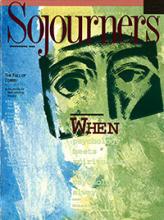The deep blue lake shimmered in the morning sunlight. Running along the shore offered too many temptations of paths to follow and rocks to climb. The panoramic views around every corner took my breath away more than the jogging did. This is Sweden, one of the most beautiful and pleasant countries in the world. I hadn't been here in several years and had almost forgotten how absolutely lovely it is.
This was my only day off in a five-day schedule that involved speaking to a national pastors conference, lecturing in a seminary, and preaching in cathedrals. Following my usual routine, I found a gym so I could work out, and this one happened to be situated on a gorgeous lake with white sails crisscrossing against a horizon of rich green forests and magnificent houses, set into steep hills that sloped down to the water's edge. Doing bench presses and taking a sauna in front of large windows that look out on to this majestic and tranquil scene was a far cry from the sweaty cinder-block rooms I usually inhabit. I felt a long way from the inner city of Washington, DC.
I stayed, as I have in the past, with Margareta and Lars Inglestam, dear friends who have been at the heart of the Christian peace movement in Sweden and beyond. Margareta has lately been the catalyst in organizing a project called Global Peace Services, which proposes worldwide training in nonviolence as an alternative to military preparations and aspires to mobilize a nonviolent "army" -- an idea that Gandhi spoke of many years ago. Among many talents, Margareta has the gift of hospitality; staying with them is always a great delight and special blessing to a weary traveler.
Read the Full Article

